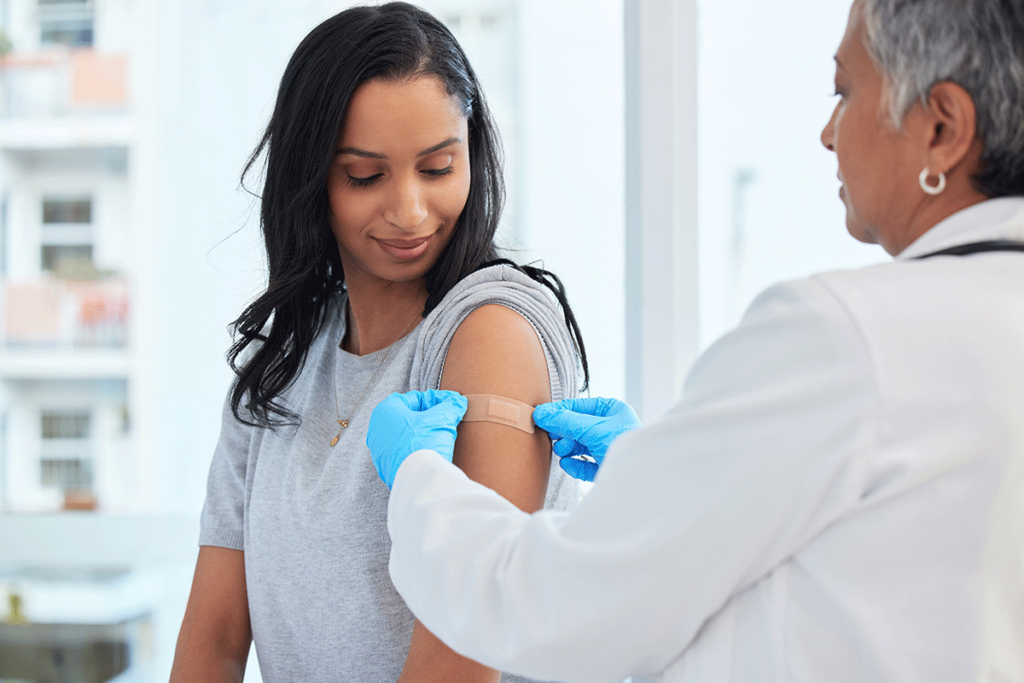Many doctors and specialists believe Vivitrol shots for recovery are among the safest medications offered in addiction treatment. Here at Ashwood Recovery, we’ve seen several success stories in prescribing opiate blocker shots and supporting their use as a recovery tool. It is important to note that a Vivitrol treatment program, like other forms of addiction treatment, is only helpful when combined with other forms.
Vivitrol injections can help the patient overcome specific physical barriers, but the psychological aspects of addiction need to be treated. Contact our knowledgeable team at Ashwood Recovery by calling 888.341.3607 to learn more about Vivitrol treatment and how it can help you overcome addiction.
What Is Vivitrol?
Vivitrol is a product administered to help drug addicts and alcoholics fight against their addiction. The product’s active ingredient is a drug called naltrexone. Unlike some other treatment medications, the drug itself is non-addictive. Although naltrexone is available in several forms, Vivitrol is an injection drug.
While products like Depade and Revia are tablets the patient ingests once daily, Vivitrol shots are administered in 380 mg doses. Patients receive one extended-release shot per month. The injections are classified as opiate blocker shots. This means that the user cannot feel the effects of opiates when naltrexone is in their system.
At our treatment center, we only offer naltrexone in injection form. We find that pills are too easy for the patient to forget or decide not to take. Monthly Vivitrol shots and a steady schedule of rehabilitation treatment are, in our opinion, the smoothest path to recovering from drug and alcohol addiction.
Vivitrol Injections for Opiate Addiction
Vivitrol has been shown to decrease the likelihood of a relapse. However, opiate blocker shots cannot be administered while the user still has opioids in their system. Therefore, rehab patients must undergo the withdrawal process for seven to 10 days before receiving their first injection. A doctor or treatment specialist will ensure that the patient has no opioids in their system before they receive an injection. However, a user who mixes naltrexone with other opioids risks precipitated withdrawal syndrome. This condition causes the addict to withdraw much faster than they should and have long-term health consequences.
Vivitrol for Alcoholism
In addition to blocking opioids from reaching the brain, naltrexone prevents endorphins from reaching the opioid receptors as well. When alcoholics drink, their body releases endorphins into the brain. These endorphins make the person feel euphoric. By preventing these endorphins from reaching the brain, naltrexone works to separate the feeling of pleasure from the alcohol itself. While taking Vivitrol and drinking it is not deadly, the user will find that they don’t experience any pleasurable aspects of alcohol. However, if the individual does drink, they may still experience the adverse effects of alcohol, such as:
- Nausea
- Vomiting
- Impaired coordination
Over time, this helps to eliminate the desire to drink booze.
Vivitrol Injection Side Effects
Although most users feel normal with naltrexone in their system, others report experiencing unwanted side effects. Some common side effects of Vivitrol include:
- Anxiety or restlessness
- Depression
- Pneumonia
- Fatigue
- Loss of appetite
- Headaches
- Joint pain
- Insomnia
- Decreased sexual functions
Since the user has become accustomed to heroin, morphine, or other opiates in their system, the body can feel uncomfortable and sore as it adjusts to life without those drugs. If you take Vivitrol and are experiencing any adverse side effects, speak with your doctor.
You can’t overdose on Vivitrol itself, but there are still risks involved in taking the drug because naltrexone blocks the opioid receptors. If they relapse, they cannot take the amount of heroin they’re accustomed to handling. This can also result in an overdose. Other risks associated with Vivitrol injections include skin infections and liver damage.
Find a Vivitrol Treatment Program in Idaho at Ashwood Recovery
If you or someone you love is struggling with alcohol dependence or opiate addiction, Vivitrol injections might help. Using Vivitrol shots for recovery as part of a more extensive rehabilitation program can make long-lasting sobriety more likely for most people. Reach out to Ashwood Recovery today at 888.341.3607 to learn more.

